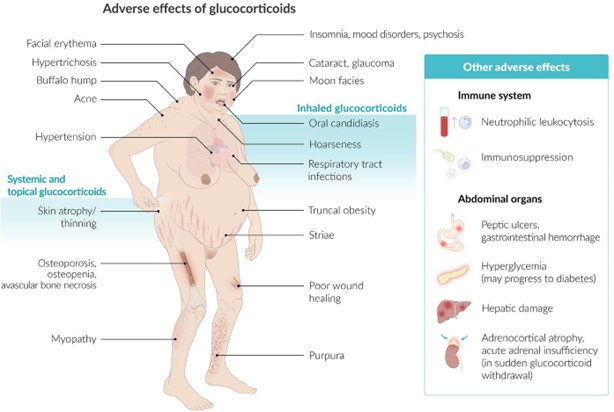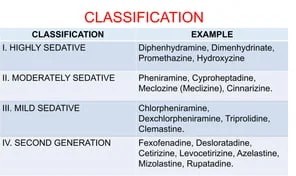A client with diabetes mellitus is being admitted to the hospital for surgery. The client has been taking Glucocorticoids (Prednisone) long-term for uncontrolled COPD. Which of the following must the nurse consider when she is obtaining a health history? (Select All that Apply.)
Due to the use of long-term glucocorticoids her medication must not be abruptly discontinued to avoid adrenal suppression
The client may develop low blood pressure
The use of long-term glucocorticoids places the client at risk for increased susceptibility to infection
The use of long-term glucocorticoids may have contributed to a spike in blood glucose levels
The client will most likely experience more pain
Correct Answer : A,C,D
The nurse must consider the following when obtaining a health history for a client with diabetes mellitus who has been taking glucocorticoids (prednisone) long-term for uncontrolled COPD:
- Due to the use of long-term glucocorticoids, the medication must not be abruptly discontinued to avoid adrenal suppression. Abruptly stopping glucocorticoids can lead to adrenal insufficiency and a potentially life-threatening condition. Gradual tapering of the medication is necessary under medical supervision.
- The use of long-term glucocorticoids may contribute to a spike in blood glucose levels. Glucocorticoids can cause insulin resistance and increase blood sugar levels, which can be problematic for individuals with diabetes mellitus.
- The use of long-term glucocorticoids places the client at risk for increased susceptibility to infection. Glucocorticoids can suppress the immune system, making the client more susceptible to infections. This is important to consider, especially in a hospital setting where the risk of acquiring infections may be higher.
Regarding the other options:
The client may develop low blood pressure: While glucocorticoids can cause fluid retention and increased blood pressure, they are not typically associated with low blood pressure.
The client will most likely experience more pain: The use of glucocorticoids is not directly related to increased pain perception. Pain management may be influenced by various factors, but it is not specifically attributed to long-term glucocorticoid use.

Nursing Test Bank
Naxlex Comprehensive Predictor Exams
Related Questions
Correct Answer is A
Explanation
Traditional antihistamines like diphenhydramine are known to have sedating properties, which can cause drowsiness and impair cognitive function. On the other hand, loratadine is classified as a non-sedating or second-generation antihistamine. It is designed to have less of a sedative effect, allowing individuals to take it during the day without experiencing significant drowsiness or impairment.

It is important to note that individual responses to medications can vary, and some individuals may still experience mild drowsiness with loratadine. However, compared to diphenhydramine, loratadine is generally associated with a lower risk of sedation.
Correct Answer is ["A","C","D"]
Explanation
"The infant's nasal congestion appeared to improve following the administration of hypertonic nasal drops. The infant tolerated the insertion of saline nose drops well, with no signs of distress or adverse reactions. The nasal passages appeared clearer after the instillation, and the infant's breathing appeared less congested. There was no significant increase in respiratory rate or other signs of respiratory distress observed. The intervention seemed to have a positive effect on the infant's nasal congestion."
This statement indicates that the mucolytic medication (hypertonic nasal drops) was administered and had a positive effect on the infant's nasal congestion. It also mentions that the infant tolerated the procedure well without any adverse reactions, such as shortness of breath or fever. The absence of distress or adverse symptoms and the observed improvement in nasal congestion indicate the effectiveness of the medication in the nurse's narrative note. The additional information about the saline nose drops and respiratory rate may not directly address the effectiveness of the mucolytic medication and can be documented separately if necessary.
Whether you are a student looking to ace your exams or a practicing nurse seeking to enhance your expertise , our nursing education contents will empower you with the confidence and competence to make a difference in the lives of patients and become a respected leader in the healthcare field.
Visit Naxlex, invest in your future and unlock endless possibilities with our unparalleled nursing education contents today
Report Wrong Answer on the Current Question
Do you disagree with the answer? If yes, what is your expected answer? Explain.
Kindly be descriptive with the issue you are facing.
